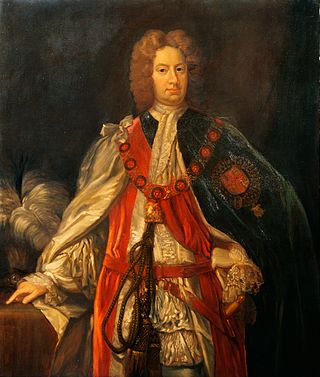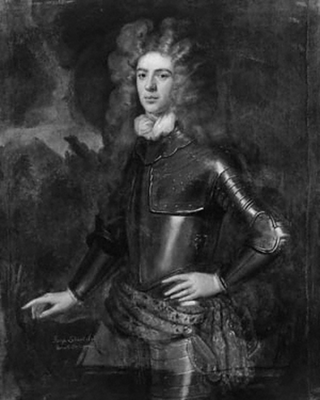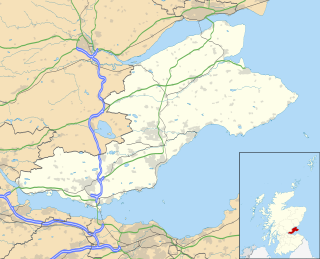Related Research Articles

James Graham, 1st Duke and 4th Marquess of Montrose was a Scottish aristocratic statesman in the early eighteenth century.

James Ogilvy, 4th Earl of Findlater and 1st Earl of Seafield, was a Scottish politician, prominent during the reign of Queen Anne. He was created Earl of Seafield in 1701 and was an active supporter of the 1707 Act of Union although by 1714 his opinion of the Union had changed and he proposed the first Self Government for Scotland Bill to end the Union.

James Douglas, 2nd Duke of Queensberry and 1st Duke of Dover was a Scottish nobleman and a leading politician of the late 17th and the early 18th centuries. As Lord High Commissioner he was instrumental in negotiating and passing the Acts of Union 1707 with England, which created the Kingdom of Great Britain.

Sir George Lockhart of Lee, of Carnwath, South Lanarkshire, also known as Lockhart of Carnwath, was a Scottish writer and Jacobite politician who sat in the Parliament of Scotland from 1702 to 1707 and as a Tory in the House of Commons from 1708 to 1715. He was a member of the Commission on the Union before 1707 but acted as an informant to his Jacobite colleagues and later wrote an anonymous memoir of its dealings. He supported the Stuart cause in the Jacobite rising of 1715.

John Hay, 2nd Marquess of Tweeddale PC was a Scottish nobleman.

David Boyle, 1st Earl of Glasgow was a Scottish politician and peer. He was the last Treasurer-depute before the Union with England.
Sir James Campbell, 2nd Baronet of Ardkinglass, was a British Army officer and Scottish politician who sat in the Parliament of Scotland from 1703 to 1707 and in the British House of Commons from 1707 to 1741.
Alexander Arbuthnot was appointed a Baron of the Court of Exchequer in Scotland after the Union of England and Scotland in 1707.
Lieutenant-General William Kerr, 2nd Marquess of Lothian, was a Scottish peer who held a number of minor military and political offices. He was known by the courtesy title of Lord Newbattle until 1692, when he succeeded as Lord Jedburgh, then as Marquess of Lothian when his father died in 1703.
The Hon. John Campbell, of Mamore, was a Scottish Whig politician who sat in the Parliament of Scotland from 1700 to 1707 and in the British House of Commons between 1708 and 1727.
James Carnegie of Finavon or Findhaven was a member of the Parliament of Scotland.
Robert Rollo, 4th Lord Rollo was a Scottish nobleman and Jacobite.

Baron of Deinboig is a title of nobility in the Baronage of Scotland in Fife.

Thomas Hay, 7th Earl of Kinnoull, styled as Viscount Dupplin from 1697–1709, was a Scottish peer and Conservative politician.

Charles Hay, 13th Earl of Erroll was a Scottish peer and Lord High Constable of Scotland who strongly opposed the 1707 union of Scotland and England.
Hon. Patrick Ogilvy of Cairnbulg and Loanmay, Aberdeen and Inchmartine, Perthshire, was a Scottish politician who sat in the Parliament of Scotland from 1702 to 1707 and as a Whig in the British House of Commons from 1707 to 1710.
Sir Patrick Johnston (1650–1736) of Edinburgh was a Scottish merchant and politician who sat in the Parliament of Scotland from 1702 to 1707 and as a Whig in the British House of Commons between 1707 and 1713. He was Lord Provost of Edinburgh three times from 1700 to 1702, from 1704 to 1706, and from 1708 to 1710.
Hugh Campbell, 3rd Earl of Loudoun, KT, PC was a Scottish landowner, peer, and statesman.
James Oswald was a Burgh Commissioner of the Parliament of Scotland, 1703-1707, representing Kirkcaldy and, later, the Member of Parliament for Dysart Burghs in the House of Commons of Great Britain.
David Bethune of Balfour (1648–1708), his last name pronounced and sometimes written as Beaton, was a Scottish landowner and politician from Fife who opposed the Union of 1707.
References
- ↑ Foster, Joseph (1882). Members of Parliament, Scotland, Including the Minor Barons: The Commissioners for the Shires, and the Commissioners for the Burghs, 1357-1882. Priv. print. by Hazell, Watson and Viney. p. 23.
- 1 2 "Fifeshire". History of Parliament Online. Retrieved 4 March 2023.
- 1 2 3 Balfour Paul, James (1904). The Scots Peerage. Edinburgh : D. Douglas. p. 545. Retrieved 7 November 2023.